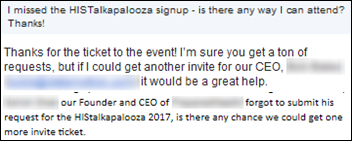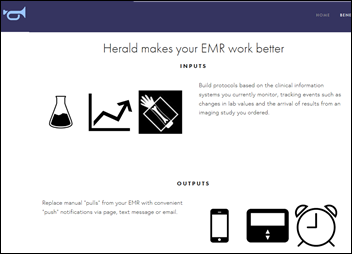Health IT Changes the Game for Workplace Wellness
From next-generation wearables to predictive analytics, healthcare technology is helping employers gain greater ROI from workplace wellness programs.
By @JennHIStalk
The month of January has come and gone, no doubt leaving a plethora of abandoned New Year’s resolutions in its wake. Personal goals related to weight loss, healthier eating, better sleep, and less stress – to name a few – have fallen by the wayside for some, as regular routines (and familiar bad habits) kick back in after the holidays. This month’s Super Bowl parties, Valentine’s treats, and even HIMSS exhibit hall fare threaten to trip up even the most dedicated of goal-keepers.
Employers of all sizes have, over the last several years, recognized they have a part to play in the resolution game – one that extends beyond pounds shed and muscle gained to fewer sick days, increased productivity, and lower overall healthcare costs for employee and employer alike. Nearly 20 percent of all employers offered comprehensive wellness programs in 2015 and 2016, according to a 2016 United Benefit Advisors survey, which also found that such programs are the most prevalent among education, government, and utilities employers.
These programs have typically consisted of health risk assessments, biometric screenings or physical exams, coaching for high-risk employees, seminars or workshops, and, of course, incentives for participation. Technology’s role in these programs has become increasingly sophisticated, evolving from basic clip-on pedometers to BYOD programs that serve up tailored employee offerings based on claims and clinical data. Some may see that level of sophistication as being in direct correlation to the out-of-pocket healthcare costs increasingly shouldered by consumers.

“In the past, employee wellness programs have mostly been built around physical health,” explains Michelle Snyder, chief marketing officer at Welltok, which has developed a wellness technology platform that uses predictive analytics to offer employees custom programs and incentives. “But now that consumers are having to take on more of the cost burden for healthcare, they’re beginning to want their employers to help them manage not only their physical health, but also their financial health, emotional health, and social connectedness.”
Employers, in turn, are looking to better control their healthcare costs and improve employee productivity, satisfaction, and morale. Snyder adds that employers are also eager to find ways to better engage employees in wellness programs already up and running. “The two main reasons we’ve found that employees aren’t engaging have to do with the fact that they didn’t know the programs existed and the programs aren’t relevant to the individual employee.”
From Pedometers to Predictive Analytics

As employers have begun to focus on more than just the physical health of their employees, their need for more tailored technologies has grown. “I think wearables sometimes get a bad rap,” Snyder says. “People will wear them and some employers think of that as the centerpiece. That’s the answer to their corporate wellness program. That’s great, but those devices should be just a piece of the bigger picture. The real-time data you can get from wearables is important, but its importance is tied to all of the other data streams that are a part of that wellness program. Those step counts, for example, have to be tied to other data sets to make it really rich and valuable for the employer, and for the employer to figure out how to better target and engage with employees.”
The State of Colorado has realized the need to think beyond pedometers in the years since it launched its wellness program. “When we launched our program in mid-2013, we secured funds to distribute 1,000 digital pedometers on a first-come, first-serve basis,” says Statewide Wellness Coordinator Nate Sassano. “Those pedometers connected automatically to a customized activity in our program. Since then, we have expanded that activity, and Welltok, which provides our platform, has expanded its digital connections. Today, employees who own just about any device can connect it to our physical activity programs on the CafeWell platform.”

Sassano has steered the state beyond pedometers to include CafeWell Concierge, an IBM Watson-powered app that offers up personalized recommendations to help employees achieve optimal health and get the most out of their state health plan benefits. “I believe that having one hub, as we do with CafeWell — where employees can go to access all of our wellness programming as well as become educated about their benefits — has greatly enhanced our program and increased participation.”
Sassano isn’t stopping there. He is in the process of expanding the offerings in the CafeWell platform to include other wellness vendors that deal with weight and stress management. He adds that, “This connection between vendors will allow our employees to participate in activities seamlessly and help them easily earn incentives for their participation.”
Turnkey Benefits
Smaller companies tend to look for similar wellness program benefits, albeit in a more turnkey fashion. Sanford, FL-based beverage distribution company Wayne Densch, for example, is somewhat new to the world of wellness programs, but is already aware of the role health technology can play in making them a success.
The company, which launched its wellness program in 2015 with biometric screenings, began using activity trackers when it adopted UnitedHealthcare’s Motion program in January 2016. The program enables employees and their covered spouses to earn up to $1,500 per year in deductible credits by meeting daily walking goals related to frequency, intensity, and tenacity. Deposits are made on a quarterly basis and help employees and their dependents offset covered medical expenses.

“As a relatively small company, it was important to find a wellness program that was largely turnkey and easy to implement, while still effective in driving engagement,” says Thomas Williams, director of accounting. “We use the program’s proprietary Trio device, which was developed to track the program’s specific walking goals. Employees are able to keep tabs on their progress using the program’s mobile app or website. By using technology that is intuitive and engaging, our employees have become more invested in maintaining and improving their well-being.”
Fine-Tuning for Better Engagement

UnitedHealthcare initially rolled out its Motion program early last year as a pilot across 12 states and has since expanded it to 40 states. That initial trial helped the company realize what employees liked and disliked about the program. “Interest in the program has been very broad, with companies across all industries and sizes adopting it,” says Craig Hankins, VP of digital products. “After introducing the program as a pilot, we identified several lessons that we applied to the broader expansion. First, to help people get going with the program, we added a registration credit. By providing a $40 credit for signing up, we created an incentive to get people started, which helped drive higher adoption rates. Second, we recognized people are interested in accessing additional devices. That’s why we worked with Qualcomm Life to introduce a BYOD model, which enables the addition of activity trackers from some of the nation’s leading technology companies.”
“Ultimately,” he adds, “the motivation for implementing Motion was simple: Help create happier and healthier employees. We know wearable devices represent a new way to encourage employees to become more active, helping people walk their way to improved health and earn financial incentives in the process.”
Understanding Employer ROI
Healthier, happier employees are surely good for a company’s bottom line, but how do employers translate happiness into lower overall costs and greater productivity? Where does the pilot phase end and true ROI begin?
Sassano seems optimistic about the State of Colorado’s expected return. “Participation in our first year was 50 percent, which I think speaks to the excitement of our employees and their interest in the program,” he says. “Of the 32,000 benefit-eligible employees we have today, we have around 52 percent participation today. While it is still early to effectively measure effects on health outcomes and productivity, we are starting to see evidence that participating employees have a lower cost in our health plans.”
Williams sings a similar tune, noting that Wayne Densch’s initial results have been positive for both employees and employer. “With participation rates exceeding 90 percent, the response from employees has been overwhelmingly positive. We are seeing walking and wellness become a bigger priority among our employees, with daily walking groups helping to keep people motivated. We have seen employees shed pounds and improve their fitness levels.”
Gaining in Importance
Employers of all sizes look to corporate wellness programs to help them trim costs and attract and retain talent. As the healthcare industry remains on high alert for impending changes to the Affordable Care Act (which may result in higher out-of-pocket costs for all), wellness programs and the technologies they use will have a greater role to play in keeping costly, preventable conditions at bay.



























































































































































































































































 .
.






















Thank you for the mention, Dr. Jayne — we appreciate the callout, the kind words and learning more about the…